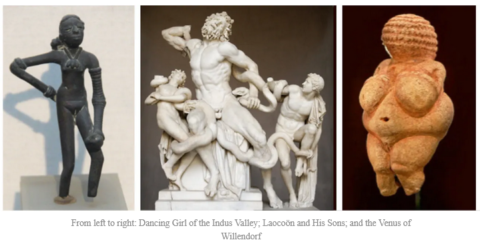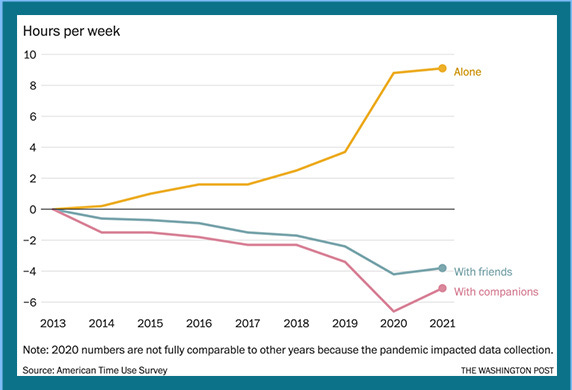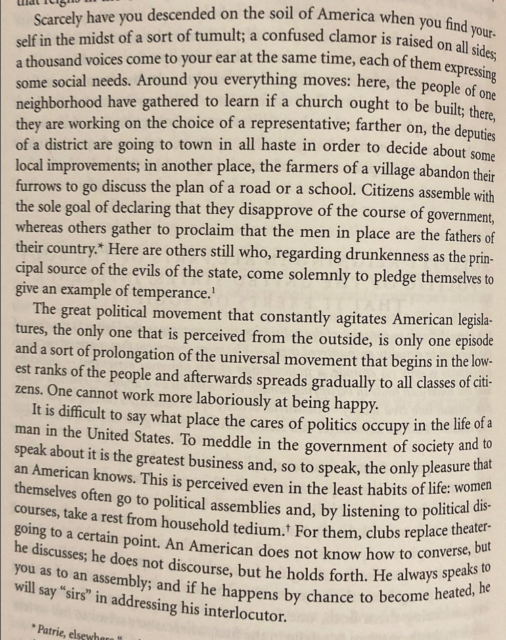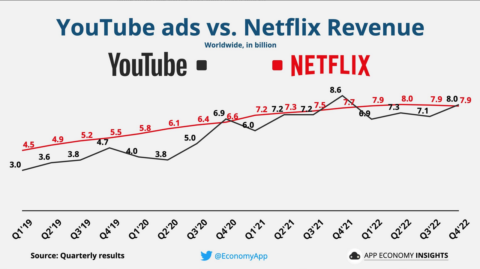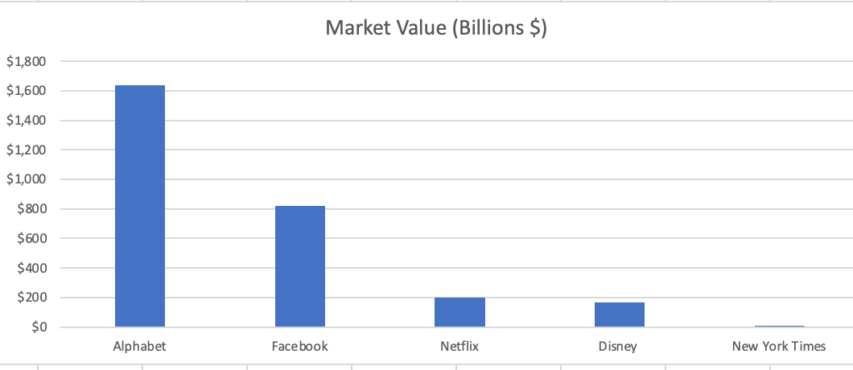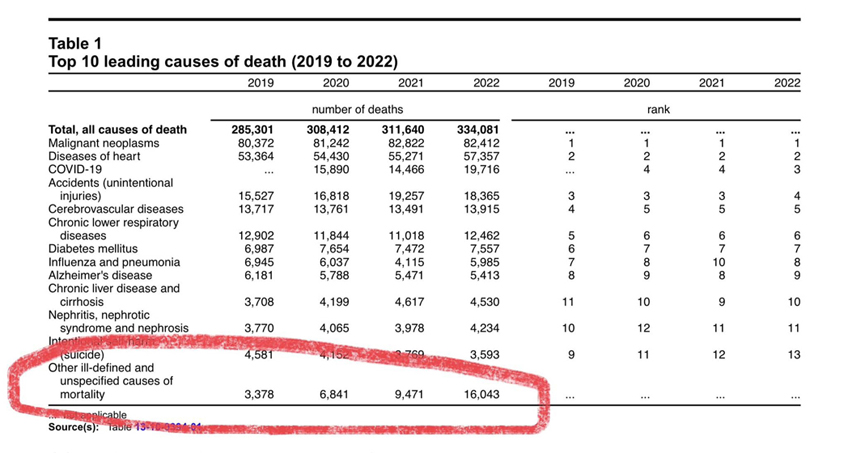Mark Knopfler
Published 15 Jul 2022Official video to part 2 of Mark Knopfler’s The Studio Albums 1996-2007 featuring the remastered recordings from Sailing To Philadelphia.
(more…)
December 17, 2023
Mark Knopfler – “Sailing To Philadelphia” (The Studio Albums 1996-2007)
December 15, 2023
“Cletus is ’bout to go kinetic, y’all”!
Chris Bray turns to movie trailer analysis as a break from his usual work. Oh, wait, no it’s not really much of a break:
Cletus is ’bout to go kinetic, y’all. I got the news straight from brunch in Brentwood, where people really understand Middle America.
The trailer has dropped for a major new movie about an American civil war. No, not that one: the next one, with the dictatorial president who seizes an unconstitutional third term and refuses to leave the White House, and is an old white guy with big hair who drawls and thinks the world of himself and totally isn’t like any real person they’re trying to compare him to.
Note that the sniper in the thumbnail has camouflaged his rifle with a pile of spaghetti to avoid being seen, but is also wearing … nail polish? I am unfamiliar with this military doctrine, but if you ever find yourself in a war, wear bright shiny things so you blend in with the trees. I hope we’ve all seen the White House Christmas video this year, because I think they might also be gesturing at this brand of postmodern ghillie suit:
Civil War is Hollywood’s other “America collapsing soon” movie, behind the Obama-backed Leave the World Behind, which sounds like a form of torture. […]
You can watch the Civil War trailer to see how utterly dogshit banal it is, but my favorite detail is that Texas and California form an alliance against the US government and secede together. Yes, a long line of development executives said, Texas and California share a political agenda and would obviously make common cause in an insurgency.
I beg you to get drunk and discover on your own what professional entertainment journalists, a real category of human existence, are saying about this movie.
Severian also saw the trailer and as you’d guess it just blew him away:
So let’s see here … Florida and Texas seceding, necessitating the use of airstrikes — indeed, of all available force — against Americans? Check. Journalists as heroes? Check. Brown-skinned folks with funny accents as the only real Americans? Check. A rebel assault on the capitol, complete with explosions at the very heart of Our Democracy™? Check! I don’t think they actually said the names in the trailer — I kinda skimmed, because it’s nauseating — but whaddaya wanna bet the President of Real America has a name like, oh, I dunno … “Joe Ryder”, and the President of Godawful Redneckistan has a name kinda like “Ronald Rumph”?
They’re really steeling themselves to do Whatever It Takes, aren’t they?
Noted in the comments by Andrew: “Fun fact no. 1: there is only one facility in the US that manufactures explosive ordinance for the military. Fun fact no. 2: that facility is in Texas.”
Oh, and apparently red sunglasses are the new MAGA hat.
QotD: Delayed onset adulthood
Don’t even get me started on supposedly-adult men of voting age who are infatuated with My Little Pony (a.k.a. “Bronies”). Great Napoleon’s bleeding ulcers, it actually turns my stomach to read about these fucking losers.
At the risk of sounding all White Christian Male and stuff [irony alert], allow me to remind everyone of this excellent precept from Corinthians:
When I was a child, I spake as a child, I understood as a child, I thought as a child: but when I became a man, I put away childish things.
Except that men aren’t doing any of that. Instead, they’re clinging to the artifacts of their childhood, hoping that Mommy will be there to keep the Big Bad Wolf/Zombies away.
What will inevitably happen is calamity. As Charles Norman puts it: “The world is running out of grown-ups. It will probably take tragedies and a prolonged era of diminished affluence for people to grow up.”
Like I said: calamity.
Kim du Toit, “Kiddies”, Splendid Isolation, 2019-08-22.
December 14, 2023
What Top Gear Really Meant
Aididan
Published 13 Aug 2023Top Gear is one of the most bizarre shows to ever exist. Not because of the quality of the show or anything, but rather because of how it evolved over the course of its existence. What exactly is it about Top Gear that makes it so special? Well, watch the video and find out.
Or don’t, I’m not your mother.
December 12, 2023
Canadian politics – if you don’t like something, call it some kind of “genocide”
Tristin Hopper on the political mis-use of the technical term “genocide”, to the point that it’s almost become routine to describe something you oppose as a “genocide”:
In recent weeks, it’s become popular among Canada’s activist groups and even mainstream politicians to accuse Israel of “genocide”. In a since-deleted Thursday evening social media post, for one, NDP MP Don Davies accused Israel of “cultural genocide” against Palestinians. The United Church of Canada has also begun using the g-word in its official literature.
The charge doesn’t hold up on any material grounds. Unlike most genocided people, the Palestinian population has been soaring dramatically ever since the 1960s — all while retaining their traditional language and religion. Israel’s prosecution of its current conflict against Hamas, meanwhile, has featured any number of factors that are markedly out-of-step with an attempted genocide, including detailed evacuation orders and a rate of civilian casualties markedly lower than the global average.
But the charge doesn’t need to make sense, because it turns out Canada has been abusing the term “genocide” for quite some time. Coined amidst the Second World War by Polish lawyer Raphael Lemkin, “genocide” refers to the intentional destruction of an entire demographic of people.
While the most notable genocides involve systematized mass-murder, it’s not a requirement. As per the official definition struck in the immediate aftermath of the Holocaust, genocide can also include attempts to erase a people via birth control or indirect methods such as famine. It’s on these grounds that Canada has officially accused China of genocide regarding its Uyghur minority. Although Beijing is not mass-murdering the Uyghurs, they are rounding them up into “re-education” camps and mandating forced sterilization with the explicit intention of destroying the Uyghur way of life.
But among Western academic and activist circles, “genocide” has now been stretched to apply to almost anything, from emissions policy to the ethnic ratios in prisons. Below, a not-at-all comprehensive list of just how much of Canadian life has been accused of being genocidal.
December 11, 2023
QotD: The Palace of Westminster
Work outwards from this change and you will begin to have some idea of how much Britain has altered. The bits you don’t or can’t see are as unsettlingly different as those tattoos. Look up instead at the Houses of Parliament, all pinnacles, leaded windows, Gothic courtyards and cloisters, which look to the uninitiated as if they are a medieval survival. In fact they were completed in 1860, and are newer than the Capitol in Washington, D.C. The only genuinely ancient part — not used for any governing purpose — is the astonishing chilly space of Westminster Hall, faintly redolent of the horrible show trial of King Charles I, still an awkward moment in the national family album. But those who chose the faintly unhinged design wanted to make a point about the sort of country Britain then was, and they were very successful. Gothic meant monarchy, Christianity, and conservatism. Classical meant republican, pagan, and revolutionary, and mid-Victorian Britain was thoroughly wary of such things, so Gothic was chosen and the Roman Catholic genius Augustus Welby Pugin let loose upon the design. Wherever you are in the building, it is hard to escape the feeling of being either in a church, or in a country house just next to a church. The very chimes of the bell tower were based upon part of Handel’s great air from The Messiah: “I know that my Redeemer liveth”.
I worked for some years in this odd place. It is by law a Royal Palace, so nobody was ever officially allowed to die on the premises, in case the death had to be inquired into by some fearsome, forgotten tribunal, perhaps a branch of Star Chamber. Those who appeared to have deceased were deemed to be still alive and hurried to a nearby hospital where life could be pronounced extinct and an ordinary inquest held. We were also exempt from the alcohol laws that used in those days to keep most bars shut for a lot of the time, and if the drinks were not free they were certainly amazingly cheap.
In my years of wandering its corridors and lobbies, of hanging about for late-night votes and dozing in committee rooms, I came to loathe British politics and to mistrust the special regiment of journalists (far too close to their sources) who write about it. I had hoped for a kingdom of the mind and found a squalid pantry in which greasy, unprincipled deals were made by people who were no better than they ought to be.
But I came to love the building. Once you had got past the police sentinels, who knew who everyone was, you could go everywhere, even the thrilling ministerial corridor behind the Speaker’s chair, from which Prime Ministers emerged to face what was then the genuine ordeal of Parliamentary questions, twice a week. There was a rifle range beneath the House of Lords, set up during World War I to make sure honorable members of both Houses would be able to shoot Germans accurately if they ever met any. There was a room where they did nothing but prepare vast quantities of cut flowers, and which perfumed the flagstone corridor in which it lay. There was a convivial staff bar (known to few) where the beer was the best in the building and politicians in trouble would hide from their colleagues. The Lords had a whole half of the Palace, with lovely murals illustrating noble moments of our history, and the Chief Whip’s cosy, panelled office where reporters would be summoned once a week for dangerous gossip and perilously large glasses of whisky or very dry sherry, generously refilled. And high up in the roof, looking down over the murky Thames, was the room where the government briefed us, in meetings whose existence we were sworn never to reveal. Now they are pretty much public, so the real briefings must happen somewhere else, I suppose.
Peter Hitchens, “An Empty Parliament”, First Things, 2017-10-03.
December 10, 2023
“The peasants are revolting!”
Chris Bray says we’re back to aristocracy:
What do Americans think of vitriolic language directed at government?
Remember that Superior Court Judge William Fahey has just tentatively ruled, in a First Amendment lawsuit over the decision by the Los Angeles County Department of Public Health to forbid public comments on its social media posts, that the county has not engaged in viewpoint discrimination, because the public is yucky:
Comments were closed to the public because many were “extreme” and vitriolic; therefore, no First Amendment violation has occurred. Government cannot discriminate against your viewpoint if your viewpoint is extreme, or if it’s expressed too strongly; the First Amendment only protects inoffensive expression.
The lowest-hanging fruit for the counterargument is all in New York Times Company v. Sullivan, in which a quite liberal Supreme Court repeatedly and very clearly spelled out the American standard for the criticism of government. Justice Arthur Goldberg, in a concurring opinion: “In my view, the First and Fourteenth Amendments to the Constitution afford to the citizen and to the press an absolute, unconditional privilege to criticize official conduct despite the harm which may flow from excesses and abuses”.
This is how the Supreme Court showed up in 1964 to start thinking about a case involving the limits of speech about public officials; as Justice William Brennan, Jr. wrote in the majority opinion, “we consider this case against the background of a profound national commitment to the principle that debate on public issues should be uninhibited, robust, and wide-open, and that it may well include vehement, caustic, and sometimes unpleasantly sharp attacks on government and public officials.”
Compare that conclusion to the argument that government has not engaged in viewpoint discrimination, because it banned comments only in the context of being addressed with vitriol. We didn’t say we didn’t didn’t like their viewpoint; we just said that their opinions were too extreme.
But here’s the important thing about New York Times Company v. Sullivan: it’s a history lesson. The majority opinion quotes James Madison and John Stuart Mill, and examines debates over public speech in the early republic. Looking at the national past and its political sources, they saw only the idea that government officials may properly be addressed with whatever degree of firmness citizens choose to apply. American politics were never polite, and were never thought to be. The tumult of a democratic republic, Tocqueville wrote, “begins in the lowest ranks of the people”, storming the seats of government to shout their disapproval:
“… if he happens by chance to become heated”. That wasn’t pathology or exception; a French observer touring America thought that heated denunciations of government were signs of … a weekday. A scholar of early American politics has written colorfully about the way national officials limited the aggressiveness of attacks on their character: they shot each other, or threatened to.
December 9, 2023
The coming Micro-Macro culture war … and who’s going to win it
Ted Gioia outlines the dismal state of the “macro” culture — television, movies, newspapers, book publishing and all the big corporations that control them — with the dynamism of the “micro” culture:
In the beginning, all culture was microculture.
You knew what was happening in your tribe or village. But your knowledge of the wider world was limited.
So you had your own songs and your own stories. You had your own rituals and traditions. You even had your own language.
But all these familiar things disappeared when you went off into the world. That was dangerous, however. That’s why only heroes, in traditional stories, go on journeys.
You learn on the journey. But you might not survive.
But all that changed long before I was born.
In my childhood, everything was controlled by a monoculture. There were only three national TV networks, but they were pretty much the same.
When I went to the office, back then, we had all watched the same thing on TV the night before. We had all seen the same movie the previous weekend. We had all heard the same song on the radio while driving to work.
The TV shows were so similar that they sometimes moved from CBS to NBC, and you never noticed a change. The newscasters also looked pretty much the same and always talked the same — with that flat Midwestern accent that broadcasters always adopted in the US.
The same monoculture controlled every other creative idiom. Six major studios dominated the film business. And just as Hollywood controlled movies, New York set the rules in publishing. Everything from Broadway musicals to comic books was similarly concentrated and centralized.
The newspaper business was still local, but most cities had 2 or 3 daily newspapers — and much of the coverage they offered was interchangeable. Radio was a little more freewheeling, but eventually deregulation allowed huge corporations to acquire and standardize what happened over the airwaves. [NR: I suspect the “freewheeling” went away once the government started imposing regulations, and the corporate consolidation was enabled when they “deregulated” the radio licensing regime several decades later.]
When I went to work in an office, back then, we had all watched the same thing on TV the night before. We had all seen the same movie the previous weekend. We had all heard the same song on the radio while driving to work.
And that’s why smart people back then paid attention to the counterculture.
The counterculture might be crazy or foolish or even boring. But it was still your only chance to break out of the monolithic macroculture.
Many of the art films I saw at the indie cinema were awful. But I still kept coming back — because I needed the fresh air these oddball movies provided. For the same reason, I read the alt weekly newspapers and kept tabs on alt music.
In fact, whenever I saw the word alt, I paid attention.
That doesn’t mean that I hated the major TV networks, or the large daily newspaper, or 20th Century Fox. But I craved access to creative and investigative work that hadn’t been approved by people in suits working for large organizations.
The Internet should have changed all this. And it did — but not much. Even now the collapse in the monoculture is still in its early stages.
But that’s about to change.
If you don’t pay close attention, the media landscape seems pretty much the same now as it did in the 1990s. The movie business is still controlled in Hollywood. The publishing business is still controlled in New York. The radio stations are still controlled by a few large companies. And instead of three national TV networks plus PBS, we have four dominant streaming platforms — who control almost 70% of the market.
So we still live in a macro culture. But it feels increasingly claustrophobic. Or even worse, it feels dead.
Meanwhile, a handful of Silicon Valley platforms (Google, Facebook, etc.) have become more powerful than the New York Times or Hollywood studios or even Netflix. It’s not even close — the market capitalization of Google’s parent Alphabet is now almost ten times larger than Disney’s.
But here’s the key point — these huge tech companies rely on the microculture for their dominance.
Where is Facebook without users contributing photos, text and video? Where is Google’s YouTube without individual creators?
In terms of economic growth or audience capture, the microculture has already won the war. But it doesn’t feel that way.
Why not?
First and foremost, Silicon Valley is a reluctant home for the microculture. To some extent Alphabet and Facebook are even going to war with microculture creators — they try to make money with them even while they punish them.
- So Mark Zuckerberg needs creators, but won’t even let them put a live link on Instagram and limits their visibility on Facebook and Threads.
- Alphabet needs creators to keep YouTube thriving, but gives better search engine visibility to total garbage that pays for placement.
- Twitter also claims it wants to support independent journalists — but if you’re truly independent from Elon Musk, your links are brutally punished by the algorithm.
This tension won’t go away, and next year it will get worse. The microculture will increasingly find itself at war with the same platforms they rely on today.
And legacy media and non-profits are even more hostile to emerging media. Go see who wins Pulitzer Prizes, and count how many journalists on alternative platforms get honored.
I’ll save you the trouble. They don’t.
December 8, 2023
“An error of this magnitude makes one wonder how robust such calculations are”
Christopher Snowden notes the proliferation of media and public advocacy groups warning us about “junk food”:
On Monday, the front page of The Times led with a speech from Henry Dimbleby and a cost-of-obesity estimate from the Tony Blair Institute for Global Change — the perfect start to the week for any Times reader. According to Sir Tony’s think tank, “the effect on national productivity from excess weight is nine times bigger than previously thought”. An error of this magnitude makes one wonder how robust such calculations are (the previous estimate only came out last year), but Mr Dimbleby saw it as further proof that food should be treated like smoking.
The NHS “will suck all the money out of the other public services” while “at the same time, economic growth and tax revenue will stagnate. We will end up both a sick and impoverished nation,” Dimbleby will warn.
Would it be unfair to point out that the USA has much higher rates of obesity than the UK and also has much higher GDP growth?
As I pointed out on what I shall continue to call Twitter, the estimates as bunkum. They come from Frontier Economics and were first commissioned by the makers of Wegovy, presumably to make their effective but expensive weight loss drug look like a relative bargain.
Their previous estimate of the cost of obesity to “society” was £58bn. This year’s estimate is £98bn, most of which (£57bn) comes from lost quality-adjusted life years. As I tire of pointing out, these are internal costs to the individual which, by definition, are not costs to wider society. I can’t stress enough how absurd it is to include lost productivity due to early death as a cost to the economy. You might as well calculate the lost productivity of people who have never been born and claim that contraception costs the economy billions of pounds.
Since the previous estimate, the costs have been bulked up by including the costs of being overweight, but there is no indication in the wafer-thin webpage of what these are. Being merely overweight doesn’t have many serious health implications. The healthcare costs have doubled, but as in the previous report, the new estimate does not look at how much more healthcare would be consumed if there was no obesity. No savings are included. What we need is the net cost.
The “report” that The Times turned into a front page news story is no more than a glorified blog post. It contains no detail, no methodology and none of the assumptions upon which it is based can be checked. It comes with an eight page slideshow from Frontier Economics which is described as a “full analysis” but which doesn’t contain any useful figures either.
Estimates like this are bound to mislead the casual reader into thinking that they are paying higher taxes because of obesity. There is no other reason to publish them, as they have no academic merit. They are designed to be misunderstood.
Sure enough, the very next day The Times was explicitly claiming that the putative £98 billion — now rounded up to £100 billion — was a direct cost to government …
The findings come after an analysis found this week that Britain’s weight problem is costing the state almost £100 billion a year.
The Real Betty Crocker’s Pineapple Upside Down Cake
Tasting History with Max Miller
Published 22 Aug 2023
(more…)
December 7, 2023
Burying the lede … and the victims
Maxime “Mad Max” Bernier sent out a fundraising letter to PPC supporters that included some disturbing new data from Statistics Canada:
As usual, the biggest news in Canada is being ignored by all of our crooked establishment politicians and the dishonest corporate media.
Last week Statistics Canada released a report on deaths in Canada (causes of death, overall life expectancy, etc), which include the latest data from 2022.
I’m not a doctor, a scientist, or even a statistician, but when I saw the table below, a few things jumped out at me.
First, deaths related to covid-19 (check the fourth line) were at an all-time high in 2022!
Can you believe that? There were more covid deaths in 2022 than the two years before.
And yet that same year saw the end of mask mandates, vaccine passports, and most covid measures.
For two years the elites blasted us with propaganda and warped our society around this mild illness, but when deaths were rising, they were silent. Bizarre!
To be clear, I am not advocating for any of these unnecessary draconian restrictions to return, I am just demanding some honesty and consistency from our morally corrupt politicians, public health officials, and media!
It has never been so obvious that covid restrictions were not scientific, they were just about politics and control.
But the most disturbing part is what I have circled at the bottom of the table. Deaths with “ill-defined or unspecified causes” have been steadily increasing since 2020.
These deaths have almost TRIPLED since 2020 from 6,841 to 16,043 in 2022.
What could be causing this? What happened in 2021 that could have caused this explosion of unexplained deaths over the last 2 years?
An experimental pharmaceutical product was rushed to market and forced on Canadian society, is what happened.
They told us it was “safe and effective” but over the last few years we have learned more and more about how that covid shot was neither.
Now more and more Canadians are dying from causes very likely related to the covid shot.
And where is the accountability?!
There is no admission of any possible error on the part of the government. On the contrary, it’s still encouraging everyone to get boosters!
There are no demands for an inquiry by the opposition parties to investigate the potential risks associated with the covid jab.
There are no investigative journalists trying to get to the bottom of one of the biggest medical scandals in Canadian history.
No! They’re just trying to sweep it under the rug and move on!
We can’t wait for the political establishment to hold itself to account. We saw throughout the covid years that the government, the opposition, and the media will all work together to protect themselves and each other.
And we can’t let them get away with it!
The only kind of conspiracy theories the media is interested in
Chris Selley points out the obvious bias legacy media polls bring to any investigation into the popularity of various conspiracy theories:
Readers, were you aware that polls show conservative Canadians are more prone to believing in conspiracy theories than liberal Canadians? I’m kidding — of course you were. The pollsters haven’t stopped asking about it since the pandemic hit: Insights West in April 2021, Angus Reid in November 2021, Abacus Data in June 2022, Leger Marketing in the spring of 2022, and again this week. And we in the media can’t get enough of it: “Conspiracy theories are popular in Canada, especially among conservatives, poll says”, was The Canadian Press headline for this week’s Leger poll.
The notion that the Conservative Party of Canada and some of its leading lights are inviting violence through unconscionably heated and conspiratorial rhetoric is endemic in the Canadian newsroom. While I’m no fan of unconscionably heated rhetoric, I very much doubt actual extremists, or potentially violent extremists, see anyone worth choosing among Canada’s federal political leaders. But in any event, it apparently needs saying that not all conspiracy theories are created equal. Some aren’t conspiracy theories at all.
To its credit, The Leger poll released this week mostly confines itself to proper conspiracies: 9/11 Trutherism, a faked lunar landing, etc. Somewhere between 36 per cent (the truth about John F. Kennedy’s assassination was covered up) and five per cent (the earth is flat) believe completely or somewhat in these notions.
But by far the most popular statement among those Leger presented to respondents was as follows: “Mainstream media manipulates the information it disseminates”. Fifty-five per cent of respondents overall agreed with that; the JFK coverup was in a distant second at 36 per cent.
What’s “mainstream media”? If it includes, say, Al Jazeera and Fox News, then the statement is obviously true. (What does “manipulate” mean, for that matter? It doesn’t necessarily imply bad faith.) And the belief is certainly not just confined to Conservative voters: 47 per cent of NDP voters and 53 per cent of Green voters agreed, compared to 69 per cent of Conservative supporters.
What the question definitely does, however, is boost the overall numbers and make them more newsworthy. So Leger (and media) can say “79 per cent of Canadians believe in at least one of the conspiracy theories we asked them about”, and “Conservative voters (94 per cent) are more likely to believe in at least one of the theories”.
That’s a quibble, really. Other polls have, in my view, been utterly shameless about this sort of results-padding.
Take this proposition, for example, which Abacus put to its respondents: “52 per cent think government accounts of events can’t be trusted”.
That is a true statement. It applies to every government in the world, ever.
Even to mention Klaus Schwab’s Great Reset in Canadian political conversation is to risk being branded a conspiracy theorist. But it’s a real-deal “world governance” manifesto, it’s absolutely bonkers from start to finish, everyone from Justin Trudeau to the King (in a previous role) has made approving noises about it, and to the very limited extent it should be taken seriously, everyone should oppose it.







